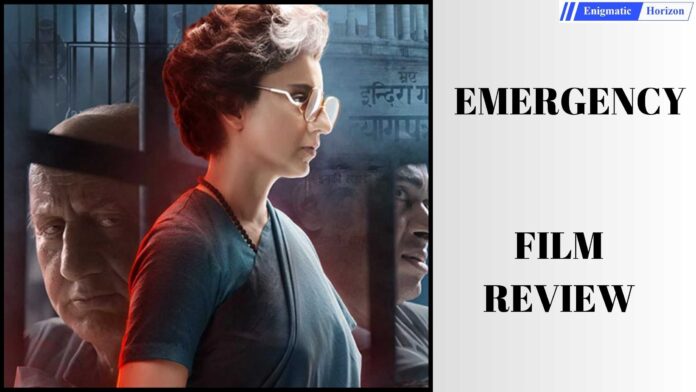Kangana Ranaut’s Emergency finally hit the screens on 17th January 2025; a film that has not just been delayed again and again but has also sparked plenty of discussions and controversy ever since its announcement. Known for her controversial and bizarre statements, Kangana takes on the monumental task of portraying India’s first female Prime Minister, Indira Gandhi, during one of the darkest periods in the country’s democratic history: the 1975 Emergency. While the film offers a crash course on Gandhi’s life, it struggles to deeply explore key events, and despite some strong performances, we could see the film didn’t reach its true potential.
At its core, Emergency promises a gripping exploration of the 1975 Emergency, a period when Indira Gandhi declared a state of emergency, curtailed civil liberties, suspended elections, and began arresting people left and right. However, the film only scratches the surface. While Kangana does attempt to touch upon significant moments like the 1971 Indo-Pak War, Operation Blue Star, and the Sikh rebellion, it never truly delves into their profound impact on the country. These pivotal events come and go, leaving viewers with little more than a brief overview. The film’s attempt to condense a monumental period of history into a mere two and a half hours often feels rushed, and maybe this is why key details getting lost along the way. One might argue that it is because the film is more of a biopic, but then again, we can say that the title of the film is misleading.
Kangana’s portrayal of Indira Gandhi is where the film both shines and falters. As a performer, she does an admirable job of recreating the iconic Prime Minister’s nuances—her charisma, nervous energy, and her often calculating demeanor. However, some might feel that her portrayal sometimes slips into parody. Some moments, especially her conversations with other political figures, feel more like an imitation than an authentic portrayal. At times, the film introduces a musical number in an absurd attempt to create a patriotic emotion, with characters like Atal Bihari Vajpayee and Sam Manekshaw breaking into a song during tense political discussions. For instance, Shreyas Talpade, who plays Atal Bihari Vajpayee, breaks into song in the Parliament, just after Indira Gandhi announces war, was a moment that feels highly unrealistic and distracting. This kind of sudden change takes away from the seriousness of the historical events, making it hard for the audience to take the movie seriously, and instead look upon it as parody.
Milind Soman was quite convincing as Sam Manekshaw but unfortunately, his screen time is minimal—he hardly has five minutes of screen time, which feels like a missed opportunity to explore his role more deeply. The film could have benefited from expanding his character to show more of his interactions and influence, particularly during the Bangladesh War, which was one of the key moments in India’s military history. Anupam Kher and Satish Kaushik, however, have a lot more screen time, and they both shine in their respective roles. Anupam Kher’s portrayal of Jayaprakash Narayan is impactful, while Satish Kaushik, in his final performance, brings a certain gravitas to his role, though the script fails to explore the political dynamics fully.
There’s also a missed opportunity to explore Indira Gandhi’s Machiavellian tendencies, her political maneuvering to crush internal dissent within her party, and the impact of her policies, such as the Green Revolution and nationalization of banks. Instead, the film takes a simplistic approach at times, focusing more on the notion of family politics and portraying Sanjay Gandhi as a one-dimensional villain. While this choice may have served the film’s narrative, and might also be an accurate portrayal, many might feel that it oversimplifies the intricacies of the time. One of the film’s biggest flaws is its treatment of the Sikh rebellion. The film doesn’t adequately address the complexities of the situation, and we can guarantee that it will leave you confused rather than informed, unless you already know about it in detail.
Many people were expecting Emergency to tarnish Indira Gandhi’s image and legacy, considering the fact that its director Kangna Ranaut is from BJP. But the movie aims to provide a balanced portrayal. The film does not paint her as the villain but shows us a complex persona. At times, we see her as a helpless mother, blind to her son’s misadventures, while at other moments, we see a resolute stateswoman.
While the performances, especially those of Anupam Kher, Shreyas Talpade, and Satish Kaushik, are noteworthy, the film’s rushed storytelling, oversimplification of historical events, and at times, superficial portrayal of its lead character leave much to be desired. For those with a passing interest in politics and history, Emergency is definitely worth a watch! Despite being a biopic and a historical drama, the film doesn’t bore its audiences, and keeps you engaged till the end.
Rating : 7.5 out of 10 stars
